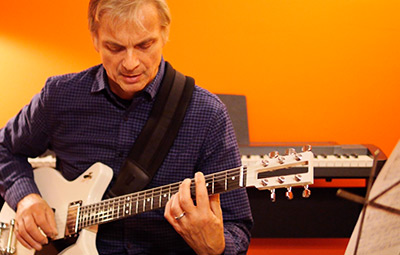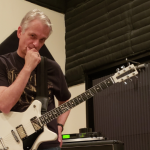Dealing with Performance Anxiety
Sweaty palms. Irregular breathing. Memory lapses. Feelings of fear and dread. What’s happening—marching to the gallows? Facing a firing squad? Bungee jumping?
No, you may be about to perform some music in front of an audience. You’ve practiced for weeks (or months, or more) and you may have even done it all before. You’ve got some talent and you’re in perfectly good health, as far as you know. So why the fuss?
Performing in front of an audience isn’t always easy, and a certain amount of nervousness is perfectly natural, in my opinion. It’s your body’s way of reacting to the challenge ahead. I like to think it could be energy building up in anticipation of release. The best performers are the one who can consistently control and direct that energy towards the tasks at hand. Instead of fearing this heightened state and allowing negativity to creep in, they welcome it and find ways to channel positive elements into their mind and body. Every performer I’ve ever known (myself included) feels or has felt some pre-show “jitters” to some degree-whether they admit or not! The fear of failure is never far away, no matter what level you’re at. You have to learn to trust yourself and let your mind and body do the things it’s supposed to do without interference from within.
| Duane Denison's next group guitar class, Rock and Beyond, starts September 17th, 2015. Enroll now. >> |
Learning to trust yourself begins with remembering to relax. If you practice meditation, you’ll know what I’m talking about. Some might think that “relaxing” means “losing your edge” or “going soft”. Far from it. Being tense and edgy makes the muscles strain unnecessarily and can make your mind become preoccupied with what others are thinking. There’s some simple exercises that can be done to avoid this, and they’re based on meditation—closing the eyes, slowing down of breathing (often with counting), focusing on your surroundings (listening deeply), and centering your body (head to toe locating of space).
Before we go on, I must address the issue of drugs and alcohol. We usually associate these things with pop stars, rappers, rockers and jazz artists, but the fact is even some classical musicians employ substances, both legal and not, to enhance their performances. I’m not going to go into much detail on this, but let’s just say the long term side effects are usually fairly unhealthy and don’t really justify the (temporary, at best) results.
For me, the next important step after relaxation is visualization. Simply put, you should try to spend some time daily picturing yourself successfully completing the task at hand. Whether it’s an actual “gig” or a rehearsal, spend time re-visiting the moment in your mind, and try to recall the details—the feel of the instrument, the smell of the air, etc. Find a word or words that can be applied to how you felt and how you want to feel now, and use that word or phrase as a “mantra” of sorts. It may come in handy when and if negative thoughts start to show up. Don’t wait until a negative idea shows up to use your personal mantra—start using it regularly and see what happens.
So that’s it from my viewpoint. There’s entire books on the subject (see below) that are far more involved and offer more detailed examples and exercises. I can honestly say that after years of performing on stages, playing in studios, and giving lessons I still find time to practice relaxation and visualization techniques. I’m realistic about it—I still make mistakes and I don’t always play as well as I think I should have. No one is perfect. But I truly feel that employing these techniques has helped me be consistent and reliable on a professional level—and it can work for you too.
DD
For further reading:
The Inner Game of Tennis by W. Timothy Gallwey
Performing Under Pressure: The Science of Doing Your Best When It Matters Most by Hendrie Weisinger and J.P. Pawliw-Fry

 Duane Denison is a renowned guitarist and educator. Named one of the top 100 guitarists of all time by Spin Magazine.
Duane Denison is a renowned guitarist and educator. Named one of the top 100 guitarists of all time by Spin Magazine.
Want to send Duane a message or set up a lesson? View his teaching profile page. >>



